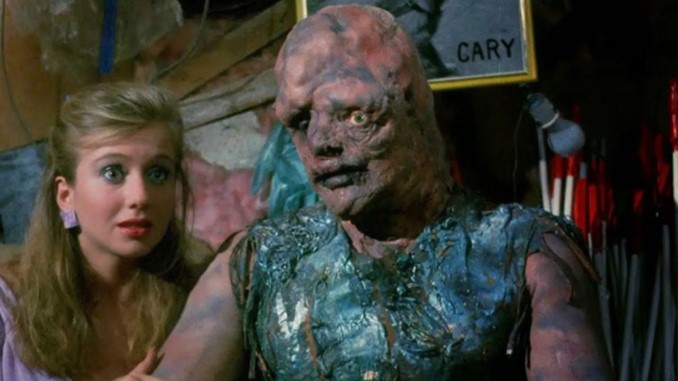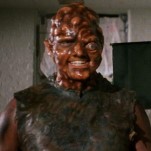Welcome (Back) to Tromaville: Home of America’s Hero, The Toxic Avenger
Photos via Troma Entertainment
I want you, for a moment, to picture the protagonist of an indie movie. Do they, by chance, happen to be a near 7-foot modern-day Frankenstein’s monster with boils the size of golf balls, Picasso eyeballs, melting skin and a trusty mop? Or are they, rather, some nebbish, 20-something intellectual living in New York City for whom ennui represents the greatest hardship of their lives? Herein lies the great lie we have been told about the history of independent cinema, a history not of film schools, black-and-white art films and mumblecore but gnarly, exploitative filth (complimentary). And perhaps nowhere on the planet, fictional or otherwise, better represents the seedy underbelly of American cinema than the toxic chemical capital of the world itself, the home to the scummiest of the scum, the sickos, the ones who have it coming, and, of, course, the one man who can give it to them. I’m talking, of course, of Tromaville and everyone’s favorite indie star, The Toxic Avenger.
It was more than 40 years ago that film fans were transported to the modest hamlet of Tromaville, its 15,000 townspeople enjoying the many comforts of small-town America; a main street, a health club, a few dingy alleyways, innocent children on playgrounds mere feet from bubbling chemical waste. Our first look at the town takes us into the world of fitness, a view of the scantily-clad lunkheads and bouncy-haired jazzercise chicks populating Tromaville Health Club. It’s here we get a glimpse of our unassuming hero; a loser with a mop, a pair of buck teeth, and little in the way of meat on his bones, a man without a friend in the world who will soon transform before our eyes.
What we don’t see is the men pulling the strings behind this morality play, the two-headed monster that is Troma Entertainment, Lloyd Kaufman and Michael Hertz. It was 10 years before the arrival of Toxie that the two men first formed their producing partnership, making waves early-on with a series of exclamatory, raunchy sex-comedies including Squeeze Play!, Waitress!, and Stuck on You! Crucially, these come before more high-profile sex comedy imitators like Porky’s and Revenge of the Nerds, displaying not only a prescience but a willingness to delve deep into the kind of muck that scares off traditional studios right up until the point they make some money. In fact, the decision to turn away from sex-comedies and into the gross-out horror that would become their calling card only came, according to Kaufman, as a direct response to being told that horror no longer made any money and so was a fool’s errand to pursue.
In many ways, this captures the ethos of Troma Entertainment as a whole. Following in the footsteps of Roger Corman, R. Crumb, S. Clay Wilson, and the like, Troma films are the closest thing we have to punk rock cinema. This is art meant to piss people off, to push buttons. The lewd sexualization and noxious violence is not for everyone, which was precisely the point. Kaufman’s brief experience with studio filmmaking left him determined to find another path, and with Troma he was able, inexplicably, to forge one himself. Most of Troma Entertainment’s deep filmography is filled with movies made for no money that made no money, existing to the pleasure of a select and fervid few for whom Toxie matters as much as Spiderman and Batman combined. The exception to this, ironically enough, is The Toxic Avenger itself which, implausibly, made somewhere around $15 million on a budget of around $900,000 (much of which was likely spent on explosions and fake heads).
-

-

-

-

-

-

-

-

-

-

-

-

-

-

-

-

-

-

-

-

-

-

-

-

-

-

-

-

-

-

-

-

-

-

-

-

-

-

-

-








































